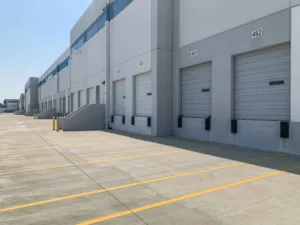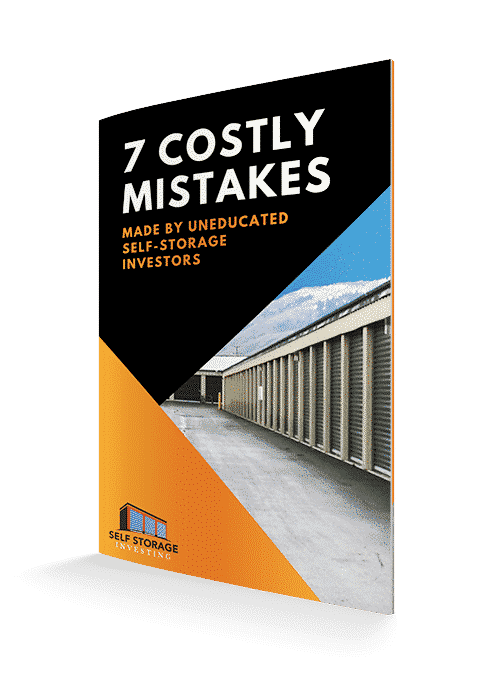Looking for a safe place to put your money during the Coronavirus market upheaval? Here are 4 things to consider about the Self-Storage industry.
The coronavirus is spreading more than germs these days. Stock markets are filled with the fear of what is to come from the coronavirus and so they are dropping fast; people are buying toilet paper faster than it can be made and hand sanitizer is being advertised at $400 a bottle! Italy has sent everyone home for 2 weeks, New York has quarantined off a mile for infected people and tourist attractions look like ghost towns.
When the world is in such a state, where do you put your money? Not in the stock market, which is highly volatile. You don’t want to invest in the travel industry because they are being hit hard by the fear of contagion. However, there is a market that is not being affected, or being affected so minutely that it is negligible, and that is Self-Storage. Even during recessions, Self-Storage does well because people need a place to put their belongings if they need to downsize. This is a market that is not affected negatively during a recession. As a matter of fact, this is a great time to be in Self-Storage.
So, the question you may be asking yourself is Self-Storage safe? Self-Storage is one of the safest commercial investments in real estate. To quote the Wall Street Journal “The past two weeks … investors flocked to owners of Self-Storage, rental-housing and infrastructure properties that have lower tenant turnover, making them typically less vulnerable to economic disruptions.”1
According to the Wall Street Journal, “Since the stock-market selloff gained steam on Feb. 24, the FTSE Nareit All REITs Index has fallen 12% and the S&P 500 has fallen 14% over the same period. Within real estate, the self-storage sector was the top performer, with returns largely flat.”2 While this may not seem that great, it is significantly better than the 12% drop that other real estate industries have seen. To sum it up, Self-Storage is not only stable, it is a very safe investment with great returns.
If you are looking for a stable investment with great returns, then you should seriously consider investing in self-storage. Most Self-Storage owners see returns above 8% into double digits. Now this does depend on how well the property is managed, advertised and maintained. Because, if you are not doing those three things then you will see much lower returns. These properties offer savvy investors opportunities to purchase properties at a discount and then make the necessary changes that allow for the higher returns. However, this isn’t an industry that you should just jump into without any prior knowledge. You don’t want to be the owner with the bad manager, lack of advertising and a fixer upper unless you know how to invest and research Self-Storage. You should find an experienced mentor who can teach you how to successfully run this type of property.
There are 4 things to consider when you are evaluating the Self-Storage Industry
1. Start by researching and finding opportunities
Commercial Realtors, LoopNet, & Commercial Websites like CREXI.com or listselfstorage.com are just some of the ways that you can locate properties that are currently for sale.
You can call local commercial real estate agents to ask them to help you locate opportunities or you can look for them yourself on the various websites listed above.
Begin by evaluating the properties to see if you have any interest. Many properties are overpriced or priced with low returns. Just because this is what they are asking for the property, doesn’t mean that it is what you have to offer. Take the time to find out if this is the right project for your situation.
Finding a property may be one of the easiest steps to entering the self-storage market. Once you have found properties that interest you, now you need to run the numbers and begin the due diligence process.
2. The next big question is “How do I know if this is a good opportunity?
When you are investing in commercial real estate, the first thing that you want to look at is the CAP rate. This lets you know approximately what your return on investment is going to be. To determine the CAP rate, you simply take the NET operating income and divide that by the purchase price or the value of the property. If the CAP rate is a very low number, then this property is probably at the maximum or over the maximum purchase price. If the CAP rate is a higher number, then you are getting a better rate of return. Most of the time, when you are looking at advertised properties the CAP rate will be close to the average of what your area sells for. Your job is to find out if there is a way to find an upside potential.
Once you have determined the CAP rate, then you want to look and see if there is a way to increase the net operating income. There are two ways to do this, increase the income or decrease the expenses. When you evaluate a property, you want to look at the vacancy rate. Is there an opportunity to increase the number of renters and therefore increase your income? Are the rents low? There are a lot of mismanaged properties that have very low rents compared to the area. Another way of increasing the income is by raising the rents gradually so that you don’t have a mass exodus. Either of these options will help you increase the net operating income.
The other way is to see if you can decrease the expenses associated with the property. However, if you have a property that has been a mom and pop store for a long time, you may spend more to bring in an onsite manager. In our training, we discuss whether or not you should have an onsite manager or a part time manager who can meet people at the property when they are interested in a tour.
If the numbers look like something that is exciting to you, then the next step is to get the property under contract and begin your due diligence period.
3. What due diligence do I need to do before buying a property?
One of the first steps in your due diligence process is going to be to evaluate the profit and loss statements as well as the last few years tax returns to make sure that the numbers that the seller gave you are accurate. Once you know that the numbers are what you expect, then you want to evaluate the area.
How is the supply and demand in the area? You want to make sure that you are not purchasing a property that has hit its maximum occupancy based on the saturation levels in the area. You want to know that if the vacancy rate is low, there is an option of increasing the number of tenants that you have. We do cover how to do this extensively in our home learning course.
You also want to make sure that the demographics are right for your area. You want to be in a location that is conducive to being rented. If you are at the freeway and there are 2 properties that are between you and the population, they are probably going to be rented before yours. You want to make sure that you have evaluated the demographics surrounding your property to verify that you will have a successful property.
If the property still looks good to you, then it is time to order a feasibility study to make sure that this is a project that you really want to move forward with. You will hire a company to do this for you. They will be able to tell you about the competition, the vacancy rates in the area, the supply and demand as well as whether or not you are in a good location. A feasibility study also helps get partners and banks on board with your project.
4. Financing the project
The next big question you may have is how I will finance these properties. Most projects are hundreds of thousands to millions of dollars. Even if you have the liquidity to pay cash for a property, you may want to consider financing the property so that you are able to purchase as many opportunities as possible. The broader your foundation of properties, the more successful you will be overall.
One type of financing that many Self-Storage owners utilize is an SBA loan or small business administration loan. This type of loan allows you to put down only 10% of the purchase price of the property. You can also purchase equipment or finance repairs that need to be done to the property. By only having to put down 10% of the purchase price, you can buy more properties. Check out the requirements for an SBA loan at https://www.sba.gov/funding-programs/loans.
Finally, finding a mentor is one of the ways that you can make sure you don’t make a rookie mistake. Find someone in your area that specializes in self-storage and then ask them to help you learn the business. Another way to make sure that you don’t make a mistake is to educate yourself on how to invest in self-storage. The research that needs to be done during due diligence is different from other types of commercial real estate. You don’t want to miss any critical steps because you are not working with people who are knowledgeable. Check out our website to find out more information on how to successfully navigate the Self-Storage business.
Self-storage is an amazing investment opportunity and now is a great time to consider reallocating your investments to an area that is long term as well as stable and profitable. Find out more about self-storage by reading our blogs or visiting our website.
1. Fung, Esther. “Investors Flock to Self-Storage, Rental Housing as Safety Plays.” Wall Street Journal, 10 Mar. 2020.
2. Fung, Esther. “Investors Flock to Self-Storage, Rental Housing as Safety Plays.” Wall Street Journal, 10 Mar. 2020.






